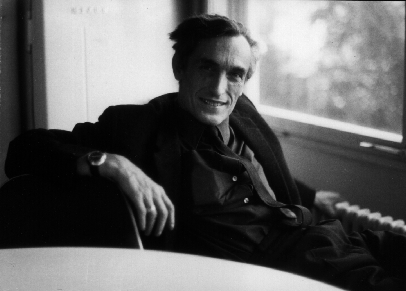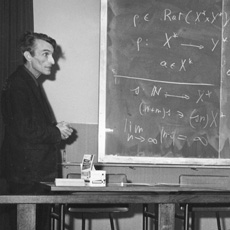<Back to Index>
- Mathematician Marcel Paul "Marco" Schützenberger, 1920
- Composer Ramon Carnicer i Batlle, 1789
- Mayor of Vienna Karl Lueger, 1844
PAGE SPONSOR


Marcel - Paul "Marco" Schützenberger (October 24, 1920 – July 29, 1996) was a French mathematician and Doctor of Medicine. His work had impact across the fields of formal language, combinatorics, and information theory. In addition to his formal results in mathematics, he was "deeply involved in [a] struggle against the votaries of Darwinism," a stance which has resulted in some mixed reactions from his peers and from critics of his stance on evolution. Several notable theorems and objects in mathematics bear his name (for example Schutzenberger group). Paul Schützenberger was his great-grandfather.
Schützenberger's first doctorate, in medicine, was awarded in 1948 from the Faculté de Médecine de Paris. His doctoral thesis, on the statistical study of gender at birth, was distinguished by the Baron Larrey Prize from the French Academy of Medicine.
Biologist Jaques Besson, a co-author with Schützenberger on a biological topic, while noting that Schützenberger is perhaps most remembered for work in pure mathematical fields, credits him for likely being responsible for the introduction of statistical sequential analysis in French hospital practice.
Schützenberger's second doctorate was awarded in 1953 from Université Paris III. This work, developed from earlier results, is counted amongst the early influential French academic work in information theory. His later impact in both linguistics and combinatorics is reflected by two theorems in formal linguistics (the Chomsky - Schützenberger Theorem and the Kleene - Schützenberger Theorem), and one in combinatorics (the Schützenberger Theorem). With Alain Lascoux, Schützenberger is credited with the foundation of the notion of the plactic monoid, reflected in the name of the combinatorial structure called by some the Lascoux - Schützenberger Tree.
Mathematician Dominique Perrin has credited Schützenberger with "deeply [influencing] the theory of semigroups", and "deep results on rational functions and transducers," amongst other impacts on mathematics.
Schützenberger's stance on "neo-Darwinism" has been the source of criticism from biologists and mathematicians. While some of his peers have chosen to pass over this aspect of Schützenberger as "too personal" to discuss, nonetheless praising it as one of his "bête-noires" alongside his thinking on artificial intelligence, or have characterized it as his being "passionately interested ... in the many flaws in the Darwinian theory of evolution as it is commonly presented," others have pointed out that his stance on Darwinism sometimes resulted in "street fighting":
Unfortunately the dialogue, with those who did not share his point of view, quickly turned into street fighting: with Schütz[enberger] to blame, said his adversaries. Note, however, that the big names Mayr and Monod always had a constant interest in his ideas and respected his culture, his person, and his always set scientific standpoint.
Schützenberger himself admitted that biology was not his speciality, but stated that "[t]he participation of mathematicians in the overall assessment of evolutionary thought has been encouraged by the biologists themselves, if only because they presented such an irresistible target." Thus his assertion of the probability of random mutations consistently giving negative results brought about a symposium in 1966 (the Wistar Symposium) where he first presented openly (along with MIT professor Murray Eden) the problems with bringing accurate mathematical probabilities using neo-Darwinism.
After his death, two journals in theoretical mathematics dedicated issues to Schützenberger's memory. He was commemorated in this manner by Theoretical Computer Science in 1998 and again by the International Journal of Algebra and Computation in 1999.
The mathematician David Berlinski provided this dedication in his 2000 book The Advent of The Algorithm --- The Idea that Rules the World: À la mémoire de mon ami . . M. P. Schützenberger, 1921 - 1996.